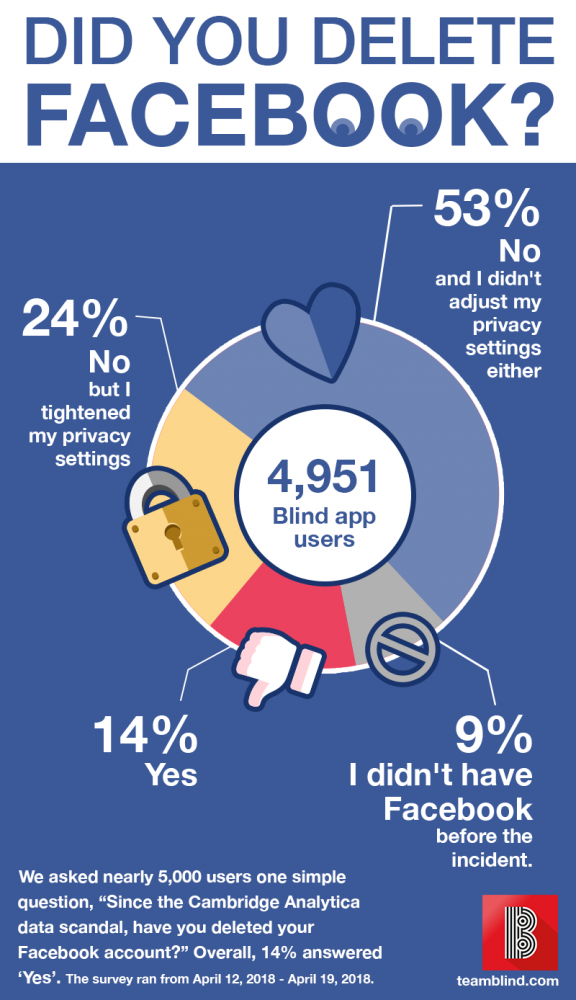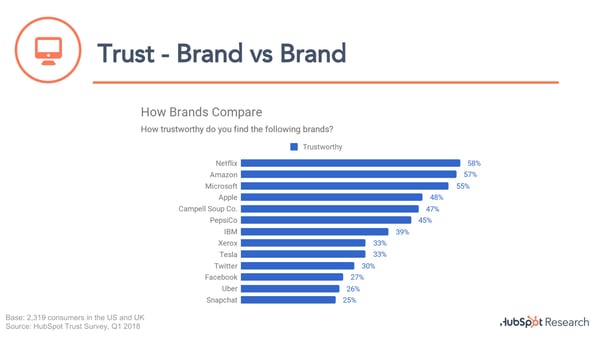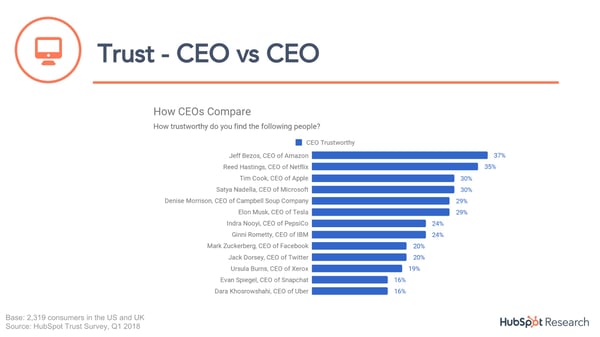Facebook CEO Mark Zuckerberg's testimony before U.S. lawmakers earlier this month seems to have done little to restore trust in the company.
According to a HubSpot survey of 300 U.S. internet users, only 12% of people trust Facebook more than they did before Zuckerberg's congressional hearings.
In fact, the results indicate that nearly half of the respondents (45%) trust Facebook even less than they did before the testimony, with 28% reporting that they have "much less" faith in the company now.
Less than half of the respondents (43%) report that their trust in Facebook has stayed the same.

While the extent to which the respondents viewed the hearings isn't immediately clear, these findings do align with recent data from Blind, an anonymous workplace app for tech company employees.
After the Zuckerberg hearings, Blind app users were asked if they've deleted Facebook since original revelations about the misuse of personal data by consulting firm Cambridge Analytica. We previously reported on an earlier Blind survey indicating that 31% of tech workers said they would delete Facebook.
According to this most recent survey, however, 13.7% of Blind app users said they did, in fact, delete Facebook, with 23.6% reporting that they restricted their privacy settings.

Source: Blind
"Trust was a recurring theme at these hearings, so it’s no surprise that trust in the company has taken a hit in the days and weeks since Zuckerberg’s testimony," says Henry Franco, HubSpot's social campaign strategy associate. "Regardless of where they stood on the political spectrum, most Senators and Representatives seemed to agree that Facebook had its work cut out for it in winning back its users’ trust, and even Zuckerberg seemed to recognize as much."
Prior to the hearings, HubSpot conducted research on the general levels of trust in a number of well-known brands -- both within tech and other consumer sectors -- and their CEOs. In that survey of 2,319 consumers in the U.S. and UK, Facebook ranked third-to-last in terms of its trust among 13 brands, with 27% of respondents calling the company trustworthy.

When asked the same question about CEOs, Zuckerberg ranked fifth-to-last, with 20% of respondents identifying him as trustworthy.

What's interesting about these findings is that the tech industry itself doesn't appear to be highly lacking consumer trust -- at least prior to the hearings. The top-ranking companies are Netflix, Amazon, and Microsoft, with over half of survey respondents indicating that they find the brands trustworthy.
Where there's less faith, it seems, is in the leadership. Even though 57% of respondents would describe Amazon as trustworthy, only 37% would say the same of its CEO, Jeff Bezos.
That could at least partially explain why Zuckerberg's hearings did no favors for public trust in Facebook. Given that faith in some executives is already less than that in the brands they lead, it makes sense that his testimony -- which left many questions largely unanswered -- would chip away at Facebook's brand trust rather than bolster it, especially in the wake of an existing scandal.
The hearings didn't end there, though. Tomorrow, Dr. Aleksandr Kogan -- the Cambridge University professor behind the data-harvesting app who eventually sold personal user information to Cambridge Analytica -- will testify before UK Parliament's Digital, Culture, Media and Sport Committee.
On Thursday, Facebook CTO Mike Schroepfer will also testify before that committee, despite Zuckerberg's presence being requested by Members of Parliament more than once.
That same day, in the U.S., the House Judiciary Committee will hold a hearing on the "filtering practices of social media platforms." Representatives from Facebook, Google, and Twitter have been invited to testify, though none have yet confirmed.
How or if these events will continue to shape consumer trust in social media remains to be seen -- though earning that trust, it seems, is a long-tail game.
"To win back trust, they’re going to need time, a grand gesture, some period without making any serious mistakes," says Franco. "Or some combination of the three."
Featured image credit: "Yesterday's news & waiting for today's news to show up. Facebook: Transparency and Use of Consumer Data hearing, Rayburn House Office Building, Washington DC" by Lorie Shaull, used under CC BY / Cropped from original
No comments:
Post a Comment